Top Influential Historians Today
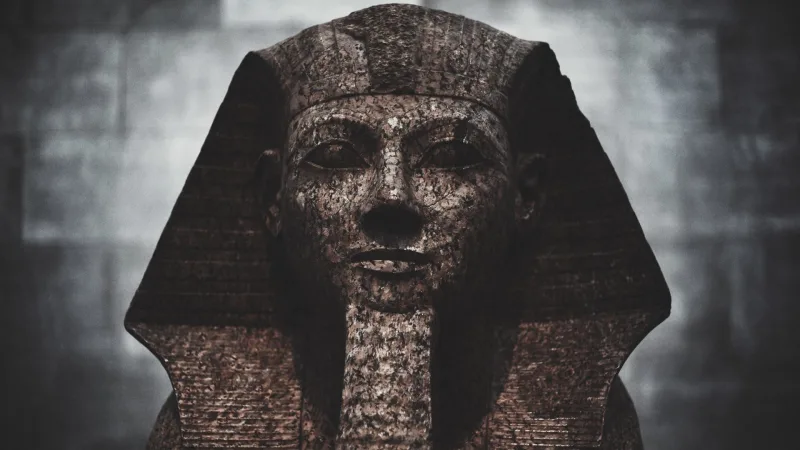
The study of human history, once rooted in oral tradition, has become an interdisciplinary field that combines qualitative and quantitative research methodologies in an attempt to understand the big picture. Modern historians seek to better understand the relationship between socio economics, culture, geography and politics, and how these forces have driven the human experience, technological advancement, and global change. In the past 150 years, historians have experimented with new approaches and have challenged our perceptions of the past, forcing us to take another look at what we think we know about where we come from, and how we got here.
Historians conduct critically important research into the past, unearthing and interpreting primary sources, and examining those historical documents through the lens of multiple disciplines. The study of history has much to teach us today and in the future. What does The Great Depression have to teach us about today’s economy? What lessons can be learned from the falling of the Berlin Wall? The work of historians helps to surface the lessons and learnings of the past for future generations.
Each of the historians profiled here have made significant contributions to historical scholarship. Some, such as Niall Ferguson, have expanded our thinking by taking a “counterfactual” approach, while others, such as David Christian, have challenged us to push beyond history and study Big History, an interdisciplinary approach encompassing psychology, anthropology, and biology. Gertrude Himmelfarb championed traditional historical methods while Andrey Korotayev viewed history through mathematical models. Through the cumulative work and knowledge of these academic luminaries, we have continued to develop improved approaches to historical research and new lenses with which to view our past and future.
Listed below are 25 Influential Historians Today, who have made significant contributions to the furtherance of our understanding of history and historical research methods. Based on our ranking methodology, these individuals have significantly impacted the academic discipline of history within 2010-2020.
What’s the value of influence in the modern world? Learn about influence networks and why they matter.
Influence can be produced in a variety of ways. Some have had revolutionary ideas, some may have climbed by popularity, but all are academicians primarily working in history. Read more about our methodology.
Note: This isn’t simply a list of the most influential historians alive today. Here we are focused on the number of citations and web presence of scholars in the last 10 years. There are other highly influential scholars who simply haven’t been cited and talked about as much in the last 10 years, whereas some new faces have been making a splash in the news, speaking events, and publishing, publishing, publishing. Our AI is time sensitive. To find some of the big names you might have expected to see here, we encourage you to use our dynamic ranking system and check influence over the past 20 and 50 years.
Top Influential Historians
2010-2020
Want more? Discover influential historians throughout history: Of All Time | Last 50 Years | Last 20 Years | Black Historians | Women Historians Note: The time-speciif links above take you to rankings that dynamically change as our AI learns new things!
1. David Christian
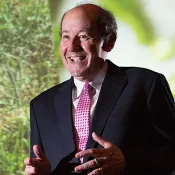
(1946 - )
Brooklyn, New York, USA
Areas of Specialization: World History, Big History, Russian History, History of Inner Eurasia
David Gilbert Christian was born in Brooklyn, New York in 1946. He completed his B.A. degree at University of Oxford before earning his M.A. in Russian history from the University of Western Ontario, and eventually culminating his studies with a Ph.D in 19th Century Russian History from Oxford University.
Christian’s research focused on Russian studies early on, and then moved on to studies into human history writ large. He integrated his research of human history with astronomy, anthropology, biology, and cosmology, and called that field of study, Big History. His Big History Project, funded by none other than billionaire philanthropist Bill Gates, teaches high school students throughout the United States and Australia to examine human history through an anthropological and biological lens.
He is the author of several books about Big History and the History of Russia. In 2005, he was awarded the World History Association Book Prize for his work, Maps of Time, and in 2014 he was honored as a Distinguished Professor by Macquarie University in Sydney, Australia. His course on Big History has been selected to be included in The Teaching Company’s Great Courses, and is freely available online. Aside from the awards, his major contribution to the field of historical scholarship is in his integrated, multidisciplinary approach to understanding history.
2.Yuval Noah Harari
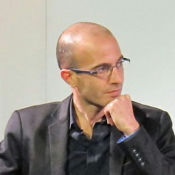
(1976 - )
Kiryat Ata, Israel
Areas of Specialization: World History, Medieval History, Military History
Yuval Noah Harari was born in Kiryat Ata, Israel in 1976. He earned his PhD at Jesus College in Oxford, specializing in the study of medieval and military history. Harari’s early works focused on the role of military engagement in human history, but he is best known for his more recent works, Sapiens: A Brief History of Humankind and Homo Deus: A Brief History of Tomorrow, which explore all of human history through a macro-historical lens.
Most recently, Harari has published 21 Lessons for the 21st Century which examines the implications of technology of the human experience and initiatives such as universal basic income. He has theorized that by 2050, technological unemployment may have reached a point where some people are, quite simply, unemployable. Universal basic income, he suggests, may be a potential solution, but ultimately the problem of technological unemployment is going to be a serious challenge in the future, and one for which we must be prepared.
His work also challenges the notion of free will, suggesting that free will is illusory and that what we feel is our individual free will is actually a mere consequence of external factors such as upbringing, conditioning, environment, and biology.
He was awarded the Polonsky Prize in 2009, (and again in 2012), and was also selected in 2012 as a member of the Young Israeli Academy of Sciences. Yuval Harari is today a professor in the Department of History at the Hebrew University of Jerusalem.
3.Niall Ferguson

(1964 - )
Glasgow, Scotland
Areas of Specialization: American and British Imperial History, Economic History
Niall Ferguson was born in Glasgow, Scotland in 1964 and attended The Glasgow Academy. He received a demyship from Magdalen College in Oxford and graduated with his Doctor of Philosophy in 1989. He has credited his family for instilling within him a love for writing and critical thought. His reading of Leo Tolstoy’s War and Peace at the age of 15 inspired him to make his career studying history.
At times a polarizing figure, Ferguson has taught at institutions on both sides of the Atlantic, from Jesus College in Oxford to Harvard University in Cambridge, Massachusetts. He is the author of several books and produced numerous documentaries. His series, The Ascent of Money won an International Emmy award for Best Documentary in 2009.
In recent years, Niall Ferguson has drawn some criticism for his right-wing leanings, though he seems to relish his role as historical provocateur. In fact, he at times seems to enjoy a “devil’s advocate” role, pushing for counterfactual approaches to understanding history by focusing more on hypotheticals.
In 2012, Ferguson worked with the BBC to present four Reith Lectures examining economics and politics. These lectures, The Human Hive, The Darwinian Economy, The Landscape of Law, and Civil and Uncivil Societies, examined the interplay of politics with fiscal policy.
Ferguson became a naturalized American citizen in 2018 and is now a senior fellow at the Hoover Institution.
See our Interview with Niall Ferguson
4.Simon Schama
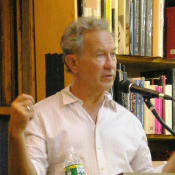
(1945 - )
Marylebone, London
Areas of Specialization: 17th-century Dutch Art, European Cultural and Environmental History
Sir Simon Michael Schama was born in Marylebone, London in 1945. He is best known as the host of a BBC series titled, “A History of Britain,” which aired from 2000 to 2002. He is a prolific author of nearly 20 books and is currently a Professor of History and Art History at Columbia University.
As a youth, he won admission to the exclusive Haberdashers’ Aske’s Boys’ School. He first studied history at Christ’s College in Cambridge, eventually graduating from the University of Cambridge. He has been the recipient of numerous awards for his work, the first being the 1977 Wolfson History Prize, which he was awarded for his book Patriots and Liberators. He was most recently elected a Fellow of the Royal Society of Literature, an honor bestowed on luminaries such as J.R.R. Tolkein, George Bernard Shaw, and Margaret Atwood.
His BBC series, The Story of the Jews, was widely acclaimed and represented the culmination of his research into 4,000 years of Jewish history. Sir Schama’s skill for storytelling has allowed him to take complex histories and bring them to life through the eyes of the people who lived them.
Sir Schama’s body of work has shed light on historical topics as diverse as Dutch history and the interplay between the environment and folk traditions, and through his work with the BBC, he has brought to life forgotten histories for new generations. His 2003 contract with BBC and Harper Collins, for which he would write three books with accompanying television series, yielded the most lucrative deal for any historian - a true testament to the depth of his knowledge. In further recognition, he was knighted by the Queen in 2018.
5.Timothy Snyder

(1969 -)
Ohio, USA
Areas of Specialization: History of Modern Eastern Europe
Timothy David Snyder was born in Ohio in 1969. He received a B.A. in history and political science from Brown University and was awarded a Ph.D in Modern History from the University of Oxford.
His research has focused on the history of Eastern Europe, a study certainly helped by Snyder’s ability to read and/or speak eleven different European languages, including German, Slovak and Russian. His linguistic skills have allowed him greater access to primary sources for his research, and, by being able to read those sources in their native tongue, was able to avoid inaccurate translations that might diminish the accuracy of his analysis. Snyder is a prolific writer, having published numerous essays and five books. His most recent book was The Road to Unfreedom: Russia, Europe, America, which was published in 2018. He has received multiple honors, from the Estonian Order of the Cross of Terra Mariana Class III to the 2017 Prize of the Foundation for Polish Science.
He has been an outspoken critic of President Vladimir Putin of Russia, as well as President Donald Trump of the United States, voicing concerns about authoritarianism and fascism. He is a sitting member of the Committee on Conscience for the United States Holocaust Memorial Museum. He is a professor of history at Yale University and a fellow at the Institute for Human Sciences.
6.Henry Reynolds
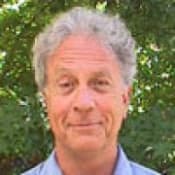
(1938 -)
Hobart, Tasmania, Australia
Areas of Specialization: Australian Colonial History, Aboriginal Studies
Henry Reynolds is a historian and researcher who specialized in the study of European Australian and Indigenous Australian conflicts. He earned a B.A. and M.A. from the University of Tasmania and a Ph.D. from James Cook University.
He began his career teaching in secondary schools throughout Australia and England before being tapped to create the Australian History program at Townsville University College. He remained a professor there until his retirement. He followed this work with an assignment as a fellow for the University of Tasmania.
His research has studied the history of violence against Aboriginal Australian peoples, of which 20,000 died during early European colonial efforts. He is also well known for his friendship with a groundsman and gardener at James Cook University, named Eddie Mabo. Their friendship opened Reynolds’ eyes to the issues and challenges faced by indigenous land owners.
Reynolds has been honored with the Ernest Scott Historical Prize, the Human Rights and Equal Opportunity Commission Arts Award, and an Australian Book Council Award. His books, The Other Side of the Frontier: Aboriginal Resistance to the European Invasion of Australia, The Whispering in our Hearts, and Unnecessary Wars (among others) are highly regarded, critical examinations of Australian Aboriginal history.
See our Interview with Henry Reynolds
7.Anthony Grafton

(1950 - )
New Haven, Connecticut, USA
Areas of Specialization: Early Modern European History, Historiography, History of Science, Intellectual History
Anthony Grafton is the Henry Putnam University Professor at Princeton University and a corresponding fellow of the British Academy. He earned a B.A. in history and an M.A. from the University of Chicago. He briefly studied at the University College in London before returning to the University of Chicago to earn his Ph.D. in history.
Grafton has focused his scholarship on the study of history from the classical era to the Renaissance. His approach has been to not just study chronological history, but also the study of how history has been recorded and understood. He has written many books and articles about history, including Bring Out Your Dead: The Past as Revelation, What Was History?: The Art of History in Early Modern Europe, and Defenders of the Text: The Traditions of Scholarship in the Age of Science, 1450-1800.
He is perhaps best known for his book, The Footnote: A Curious History, in which he attempts to understand the history of history from a novel viewpoint. In 1993, he was awarded the Los Angeles Time Book Prize in history. He has also received a Balzan Prize for History of the Humanities, and a Rome Prize from the American Academy in Rome.
In 2011, Grafton delivered the Sigmund H. Danziger, Jr. Memorial Lecture in the Humanities at the University of Chicago.
8.Marnie Hughes-Warrington
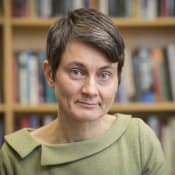
(1950 - )
South Australia, Australia
Areas of Specialization: Historiography, Philosophy of History, History Education
Marnie Hughes-Warrington recently moved from Australian National University to take the position of Deputy Vice Chancellor, Research and Enterprise at the University of South Australia. She attended University of Tasmania, where she earned a bachelor of education degree with a specialization in philosophy and history. She became a Rhodes Scholar and went on to earn a D.Phil. from Merton College at Oxford.
She spent her early academic career teaching and has taught at institutions such as the University of Oxford, Macquarie University, University of Washington, Leipzig University and Harvard University. She has also held a number of academic leadership roles, serving as the Pro-Vice Chancellor of Learning and Teaching for Monash University and the Deputy Vice-Chancellor of Academics for Australian National University.
Hughes-Warrington has written seven books, including Fifty Key Thinkers on History (translated into several languages), How Good an Historian Shall I Be?: R.G. Collingwood, the Historical Imagination and Education, and most recently, History as Wonder: Beginning with Historiography.
She was awarded the Australian Prime Minister’s Award for University Teacher of the Year in 2008, the same year that she was honored with the Teaching Excellence Award in Humanities and the Arts by the Australian Learning and Teaching Council. In 2013, she was recognized with the University of Tasmania Foundation’s Graduate of the Year Award.
9.Eric Foner

(1943 - )
New York, New York, USA
Areas of Specialization: American Political History
Eric Foner was born in New York City in 1943. After initially beginning his studies at Columbia University in pursuit of a B.A. in physics, he changed majors and eventually graduated with a B.A. in history. He earned his Ph.D from Columbia University in 1969.
He is known as an expert in the study of the Reconstruction period following the Civil War. His writings are widely acclaimed, in fact, his book The Fiery Trial: Abraham Lincoln and American Slavery won the Lincoln Prize and the Pulitzer Prize for history. His most recent work, Gateway to Freedom: The Hidden History of the Underground Railroad, was well received for its pragmatic and sensitive approach to understanding Abraham Lincoln’s historic role in the eventual abolition of slavery.
Foner credits his father with inspiring within him a love for history and the practice of using a historical lens to contextualize present events. Throughout his career, he has written numerous books exploring African American history, Civil War/Reconstruction, political history, and historiography. He has been teaching at Columbia University for several decades and has served as a guest lecturer for Princeton University, University of Oxford, and University of Cambridge. Today, he serves on editorial boards for multiple outlets and has written for PBS, The History Channel, and The Washington Post, among others.
See our Interview with Eric Foner
10.Dipesh Chakrabarty

(1948 -)
Kolkata, India
Areas of Specialization: Postcolonial Theory, Subaltern Studies
Dipesh Chakrabarty is the Lawrence A. Kimpton Distinguished Service Professor of History at the University of Chicago. He earned an undergraduate degree in physics from Presidency College at the University of Calcutta. He earned an MBA from Indian Institute of Management Calcutta and a Ph.D. in history from the Australian National University.
Chakrabarty has made substantial contributions to postcolonial theory and subaltern studies. He has focused on intersections between history, colonialism, postcolonialism, historicism and nationalism. He has lectured for universities around the world, from Princeton University to the Max Planck Institute for Historical Sciences at the University of Göttingen, Germany.
He has written a number of books, including Rethinking Working-Class History, Provincializing Europe: Postcolonial Thought and Historical Difference, and The Crises of Civilization: Exploring on Global and Planetary Histories.
He has been a Fellow of the American Academy of Arts and Sciences since 2004 and was designated an Honorary Fellow of the Australian Academy of the Humanities in 2006. In 2014, Chakrabarty was recognized with the Toynbee Prize, an honor for social scientists making significant scholastic contributions. Most recently, he received the Tagore Memorial Prize from the government of West Bengal, India.
Today, he is a contributing editor for Public Culture, Duke University Press’ interdisciplinary academic journal.
11.Richard J. Evans

(1947 -)
Woodford, London, England
Areas of Specialization: History of Germany, Historical Method, Theory of History, Historiography
Richard J. Evans is the Provost of Gresham College and a highly regarded historian. He earned an M.A. from Jesus College at Oxford and a D.Phil. from St. Antony’s College at Oxford.
He is best known for his work on German history, with multiple academic works to his credit, including The Third Reich Trilogy (The Coming of the Third Reich: How the Nazis Destroyed Democracy and Seized Power in Germany, Third Reich in Power, and The Third Reich at War: How the Nazis Led Germany from Conquest to Disaster and his most recent book, Eric Hobsbawm: A Life in History.
Evans was knighted as part of the 2012 Birthday Honours and is a founding fellow of the Learned Society of Wales. He was awarded the 1988 Wolfson History Prize, the 1994 Fraenkel Prize in History and the 1993 Civic Medal for Arts and Sciences of the Free and Hanseatic City of Hamburg.
Evans has not been without controversy. His views on the Holocaust and Marxism have drawn both criticism and admiration. He remains active as a lecturer and contributor for the History Channel’s documentaries about Germany and World War II.
12.Barbara Engelking
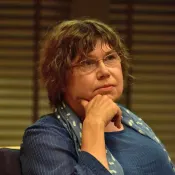
(1962 - )
Warsaw, Poland
Areas of Specialization: Holocaust in Poland
Barbara Engelking is the founder and director of the Polish Center for Holocaust Research, a practicing sociologist, author and editor. She earned an M.A. in psychology from the University of Warsaw and a Ph.D. in sociology at the Polish Academy of Sciences.
Engelking is a scholar of the Holocaust, driving important conversations about the role non-Germans played in the persecution of Jews. Her research has resulted in books such as Such a Beautiful Sunny Day: Jews Seeking Refuge in the Polish Countryside, 1942-1945 and The Warsaw Ghetto: A Guide to the Perished City. The latter book, written in collaboration with Jacek Leociak, features detailed historical maps of long-forgotten streets and buildings.
As with most scholars of the Holocaust, Engelking has had her share of controversy. Some critics have pointed out inconsistencies in her characterization of the actions and intentions of certain individuals. Even so, her nuanced and heavily researched work has brought to life hidden aspects of the Polish/Jewish experience during the Holocaust - a history misunderstood by many today who have been misinformed of the real role of Polish citizens during the Nazi Holocaust.
She has been the chair of Poland’s International Auschwitz Council since 2014 and served as the Ina Levine Invitational Scholar at the United States Holocaust Memorial Museum’s Mandel Center.
13.Jan T. Gross

(1947 - )
Warsaw, Poland
Areas of Specialization: Holocaust, Jewish, Political History
Jan T. Gross is the Norman B. Tomlinson Professor of War and Society and Professor of History for Princeton University. After studying physics at the University of Warsaw, he went on to earn a Ph.D. in sociology from Yale University.
A scholar of Polish history and Jewish-Polish relations, Gross has written several books about anti-semitism in Poland, most notably, Fear: Anti-Semitism in Poland after Auschwitz and Golden Harvest: Events at the Periphery of the Holocaust, which he wrote with his wife. In these works, he examines the experience of Jews in Poland during World War II, and the ways in which some people chose to profit from the exploitation of Jews.
As with many scholars who have studied the Holocaust and the Jewish experience, Gross has been met with controversy. He published an essay in a German newspaper in 2015 which suggested that Polish people killed between 100,000-200,000 Jews during world War II, an assertion strenuously denied by the Polish government. A lawsuit filed against him was later dismissed after prosecutors found that no crime was committed.
He was recognized in 1996 with the Order of Merit of the Republic of Poland for his outstanding historical scholarship. In the wake of his controversy with the government of Poland, the Polish government attempted to rescind the award, an effort widely criticized by the historical community.
14.Samuel Moyn
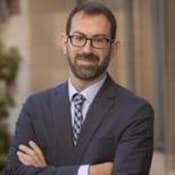
(1972 - )
Areas of Specialization: International Law, Human Rights, 20th-century European Moral and Political Theory
Samuel Moyn was born in 1972. He earned a B.A. from Washington University in St. Louis and a Ph.D from the University of California, Berkeley and a Juris Doctorate from Harvard Law School.
He is notable for his research in human rights, international law, war, political and legal thought, historical theory, and modern European intellectual history. His first book, Origins of the Other: Emmanuel Levinas between Revelation and Ethics, was published in 2005, and his most recent work, Not Enough: Human Rights in an Unequal World, was published in 2018. He has won numerous fellowships and honors from organizations such as the Berggruen Institute and the John Simon Guggenheim Memorial Foundation. His written works have won the Morris Forkosch Prize and the Halpern Milton Memorial Book Prize and he was honored by undergraduate students at Columbia University, who gave him the Mark van Doren Teaching Award.
Today, he continues his work as a Professor of Jurisprudence and History at Yale University, while researching and writing a new book about the origins of humane war for Farrar, Straus, and Giroux. He is also a guest columnist for such publications as The New York Times, Boston Review, The Chronicle of Higher Education, and many more.
15.Antony Beevor

(1946 - )
London, England, UK
Areas of Specialization: English Military History
Sir Antony Beevor was born in London, England in 1946. He attended the Royal Military Academy Sandhurst before spending four years in the British Army. He is best known for his work as a military historian. His books have been translated into more than 30 different languages and are critically acclaimed. His book, Stalingrad, was the recipient of the Wolfson History Prize, the Hawthornden Prize for Literature, and the Samuel Johnson Prize for Non-Fiction.
His examination of World War II stands out for its depictions of the civilian experience. Beevor has been, at times, controversial, and been criticized for appearing too sympathetic to Nazis. Most notably, Beevor’s narrative style of writing has renewed interest in somewhat obscure topics, encouraging a re-examination of our understanding of the past. He was honored with a Lifetime Achievement in Military Writing award in 2014 by the Pritzker Military Museum Library.
Beevor is a visiting professor for the School of History, Classics, and Archaeology at Birkbeck, University of London and at the University of Kent. He was knighted in 2017 by the queen for his support of “Armed Forces Professional Development”. His most recently published work, Arnhem: The Battle for the Bridges, 1944, was published in 2018.
16.Sven Beckert

( - )
Areas of Specialization: Labor History, History of Capitalism
Sven Beckert is the Laird Bell Professor of American History at Harvard University, co-chair of the Weatherhead Initiative on Global History, co-editor of the Princeton University Press book series, “America in the World”, and the co-director of the Program on the Study of Capitalism at Harvard University. He began his studies at the University of Hamburg, Germany, where he studied political science, economics and history. He went on to earn a Ph.D. in history from Columbia University.
In his role as professor, Beckert teaches classes on labor history, global capitalism, the history of American capitalism, America in the Gilded Age, political economy and the history of European capitalism. He is best known, however, for Empire of Cotton: A Global History, which was awarded the Bancroft Prize and was a finalist for a Pulitzer Prize. While some consider it a survey of the economic history of cotton, others have seen it more as a history of the crop. Regardless, The New York Times declared it one of the top ten books for that year.
He is a Guggenheim Fellow and was also named Fellow of the American Council of Learned Societies, the Freiburg Institute for Advanced Studies and the New York Public Library.
17.William Dalrymple

(1965 - )
Scotland
Areas of Specialization: History of the Middle East, India and Central Asia
William Dalrymple is a prolific writer and historian, and the OP Jindal Distinguished Lecturer at Brown University. He attended school at Ampleforth College and Trinity College at Cambridge. Dalrymple still spends part of each year at his home in India.
Dalrymple has studied the art and history of countries and regions through the Middle East, India and Central Asia. He has published many award-winning books about his research, including The Last Mughal, which was awarded the Duff Cooper Memorial Prize for History and Biography and the Vodafone Crossword Book Award; White Mughals: Love Betrayal in Eighteenth-Century India, which won the Scottish Book of the Year Prize and the Wolfson Prize for History, and The Age of Kali, which was awarded the French Prix d’Astrolabe. His books have been translated into 40+ languages.
He is a fellow of the Royal Asiatic Society and a corresponding fellow of the Royal Society of Edinburgh. He most recently published a book about the history of India between 1739 and 1803, titled The Anarchy: The East India Company, Corporate Violence, and the Pillage of an Empire. He is an ongoing contributor to The Guardian, the New Statesman and The New Yorker. In recent years, he has been touring throughout the UK, India, Pakistan, Holland and other countries with his band, which is made up of Sufis, Bauls, Fakirs and Theveram singers.
18.James M. McPherson

(1936 - )
Valley City, North Dakota, USA
Areas of Specialization: American History
James McPherson was born in Valley City, North Dakota in 1936. He earned a B.A. from Gustavus Adolphus College and a PhD at Johns Hopkins University. Winner of the 1989 Pulitzer Prize for his book, Battle Cry of Freedom: The Civil War Era, he is an esteemed Civil War historian and scholar.
McPherson was honored as the Jefferson Lecturer by the National Endowment for the Humanities in 2000 for his exemplary work and scholarship in raising awareness of America’s history, most notably during the American Civil War. In 2007, he became the first ever recipient of the Pritzker Military Library Literature Award.
He has been a strong advocate for the preservation of Civil War monuments and battlegrounds and has served on numerous boards for the historical preservation of such sites. His fervent study of America’s Civil War history has given him a nuanced viewpoint on how America should commemorate this part of its past, leading him to ask then President Barack Obama to avoid laying a wreath at the Confederate Monument Memorial at Arlington National Cemetery, suggesting that to do so gives encouragement to the continued reverence of Confederate ideas.
Today, James McPherson is the George Henry Davis Professor Emeritus of United States History at Princeton University and a member of the board for Encyclopedia Britannica.
19.Kenneth Pomeranz
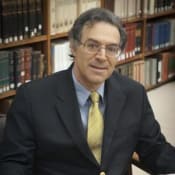
(1958 - )
Areas of Specialization: Modern Chinese History
Kenneth Pomeranz was born in 1958. He earned a B.A. from Cornell University and a Ph.D from Yale University. His research interests have been the interrelationships of socioeconomic, political, and ecological changes and how those shifts impacted the lives of common people in Chinese society, as well as impacts of industrialization on Europe and how that industrialization spread throughout the world.
He is best known for his work, The Great Divergence: China, Europe, and the Making of the Modern World Economy, which is a reflection of his larger body of work, tying together his interest in industrialization, economic expansion, and the resultant social and cultural shifts. He has been awarded the World History Association Book Prize and the John K. Fairbank Prize for best book in East Asian history. In 2017, he was elected a Corresponding Fellow of the British Academy, which is Britain’s national academy for the humanities. He served as president of the American Historical Association in 2013-2014 and is now professor of history at the University of Chicago.
Pomeranz is currently working on a book about China from the 17th century to the present, focusing on how it came to include such a massive land mass and population relative to other countries in the world.
20.Margaret MacMillan

(1943 - )
Toronto, Ontario, Canada
Areas of Specialization: European History, International Relations
Margaret MacMillan was born in Toronto, Ontario, Canada in 1943. She received a B.A. from the University of Toronto’s Trinity College, and a B.Phil and D.Phil at University of Oxford. Her great grandfather is former British Prime Minister David Lloyd George.
She has spent her career seeking to better understand the British Empire and its international relationships from the 19th-20th centuries. She is most widely known for her book, Peacemakers: The Paris Peace Conference of 1919 and Its Attempt to End War, which won the Duff Cooper Prize, the Hessell Tiltman Prize, the 2003 Governor General’s Literary Award for Canada, and the Samuel Johnson Prize for best work of nonfiction.
MacMillan is frequently sought out for her understanding of European history and has authored several notable op-eds for The New York Times, covering topics such as globalization, international relations, and radicalism.
MacMillan was made a Companion of the Order of Canada in 2015, the highest merit honor of its kind in Canada. She is a professor of history at the University of Oxford, a Distinguised Fellow at the University of Toronto and a sought-after commentator. In 2017, she was honored as a fellow at Lady Margaret Hall in Oxford. She is currently the Reith lecturer, and her series, The Mark of Cain, is touring major cities around the world.
21.Romila Thapar

(1931 - )
Lucknow, United Provinces, British India
Areas of Specialization: Indian History
Romila Thapar is an emerita professor of history at Jawaharlal Nehru University. She earned a bachelor’s degree in English literature at Panjab University, and a bachelor’s degree and Ph.D. in Indian history from the School of Oriental and African Studies at the SOAS University of London.
Her work has focused on increasing understanding of Indian history. She has written several major works on the topic, including Aśoka and the Decline of the Mauryas, Ancient Indian Social History: Some Interpretations, Recent Perspectives of Early Indian History (for which she was editor), A History of India Volume One, and The Penguin History of Early India: From the Origins to AD 1300.
She has also provided leadership through her work as the General President of the Indian History Congress and as the US Library of Congress’ Kluge Chair in Countries and Cultures of the South. Thapar has taught at the University of Pennsylvania, Cornell University and the College de France, and is an honorary fellow of St. Antony’s College and Lady Margaret Hall at Oxford and the School of Oriental and African Studies at the University of London.
She has twice rejected the Padma Bhushan award offered by the Indian government, on the grounds that she wishes not to be recognized with awards from non-academic institutions.
22.Norman Davies

(1939 - )
Bolton, Lancashire, England
Areas of Specialization: European History
Norman Davies is UNESCO Professor at Jagiellonian University, professor emeritus at University College London and a historian. He earned a B.A. in history from Magdalen College at University of Oxford, an M.A. at the University of Sussex, and a Ph.D. at Jagiellonian University.
His research interests have included the history of Central and Eastern Europe, particularly during the period of the Holocaust. Davies work has drawn criticism from some scholars for minimizing the existence of antisemitism and suggesting that the suffering of non-Jewish polish citizens has been ignored. His controversial views contributed to his inability to achieve tenure at Stanford University, based on questions about inaccuracies in his body of work.
He has been widely-recognized nonetheless. He has been awarded the Aleksander Gieysztor Prize, the Knight of Freedom Award, and the Order of the Cross of St. Mary’s Land. A member of the Polish Academy of Learning and the Academia Scientiarum et Artium Europaea, he has also been honored with the Order of the White Eagle, Poland’s most prestigious civilian honor. He is the author of Beneath Another Sky: A Global Journey into History, Trail of Hope: The Anders Army, An Odyssey Across Three Continents, and Vanished Kingdoms: The History of Half-Forgotten Europe.
23.Orlando Figes
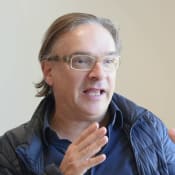
(1959 - )
Areas of Specialization: Russian History
Orlando Figes is a historian and writer who is professor of history at Birkbeck, University of London. He earned a double-starred first in history from Gonville and Caius College at Cambridge. He went on to earn a Ph.D. from Trinity College at Cambridge.
A scholar of Russian history, Figes has written extensively about the history of the country from a social perspective. His writings include Peasant Russia Civil War: The Volga Countryside in Revolution 1917-21, a study of the lives of Russian peasants during the period of 1917-1921 and A People’s Tragedy: The Russian Revolution: 1891-1924, which is a survey of the period from 1891 to Lenin’s death in 1924. This book in particular, named one of the most influential books since the war by the Times Literary Supplement, is regarded as career defining. This book was recognized with the Wolfson History Prize, the Longman-History Today Book Prize, NCR Book Award and the Los Angeles Times Book Prize.
A vocal and fearless critic of Vladimir Putin, Figes has faced controversy and criticism in Russia. He has had his offices raided by Russian police and had to fight the government in court to get his research documents returned.
In recent years, Figes has continued his research and writing, as well as providing consultation for historical movies and television series.
24.Jon Meacham

(1969 - )
Chattanooga, Tennessee, USA
Areas of Specialization: American History, World History
Jon Meacham is the Carolyn T. and Robert M. Rogers Endowed Chair in American Presidency at Vanderbilt University, an author, a contributing writer to The New York Times Book Review, and a contributing editor to Time magazine. He earned a bachelor’s degree from Sewanee: The University of the South.
Meacham has been deeply interested in politics since his youth and has written extensively about notable figures in American and world history. His presidential biographies include Thomas Jefferson: The Art of Power, Destiny and Power: The American Odyssey of George Herbert Walker Bush, and American Lion, Andrew Jackson in the White House, for which he won a Pulitzer Prize. Having been hired by the family of President Bush to write his biography, he became close to the family, eventually eulogizing both President Bush and his wife when they passed away.
He has published numerous other books, including American Gospel: God, the Founding Fathers, and the Making of a Nation, The Soul of America: The Battle for Our Better Angels and most recently, The Hope of Glory: Reflections on the Last Words of Jesus from the Cross.
Meacham is a frequent guest and commentator on shows such as Real Time with Bill Maher and MSNBC’s Morning Joe.
25.David Cannadine

(1950 - )
Birmingham, England
Areas of Specialization: Modern History, History of Business and Philanthropy
Sir David Cannadine was born in Birmingham, England in 1950. He attended Clare College in Cambridge before earning a DPhil at St. John’s College in Oxford. He has completed fellowships at Princeton University, Christ’s College, and St. John’s College.
Cannadine is best known for his historical commentary on BBC radio and television, as well as his roles at the helm of many respected historical societies in Europe and abroad. He specializes in the history of business and philanthropy, and has written numerous books about contemporary figures such as Winston Churchill and Carnegie Mellon.
He was knighted in 2009 for his scholarship work and has been elected a fellow for numerous historical societies such as the Society of Antiquaries and the Royal Historical Society. He was awarded the Dickson Medal by the Newcomen Society in 2003 and elected an honorary member of the American Academy of Arts and Sciences in 2018.
Today, Cannadine is a professor of history at Princeton University and the editor of the Oxford Dictionary of National Biography. He has held many leadership positions of import for historians, and is widely respected as the President of the British Academy, which is a national academy for humanities in Great Britain.
Honorable Mentions in History
- Robert C. Allen, New York University, Abu Dhabi
- Eamon Duffy, University of Cambridge
- Barry Eichengreen, University of California at Berkeley
- Cormac Ó Gráda, University College Dublin
- Harvey J. Graff, Ohio State University
- Gertrude Himmelfarb
- Andrey Korotayev, National Research University Higher School of Economics
- Suzannah Lipscomb, University of Roehampton
- Diarmaid Macculloch, University of Oxford
- Joel Mokyr, Northwestern University
- Griselda Pollock, University of Leeds
- Matthew Restall, Pennsylvania State University
- Lyndall Ryan, University of Newcastle
- John Tosh, University of Surrey, Roehampton
- Daniel Woolf, Queen’s University